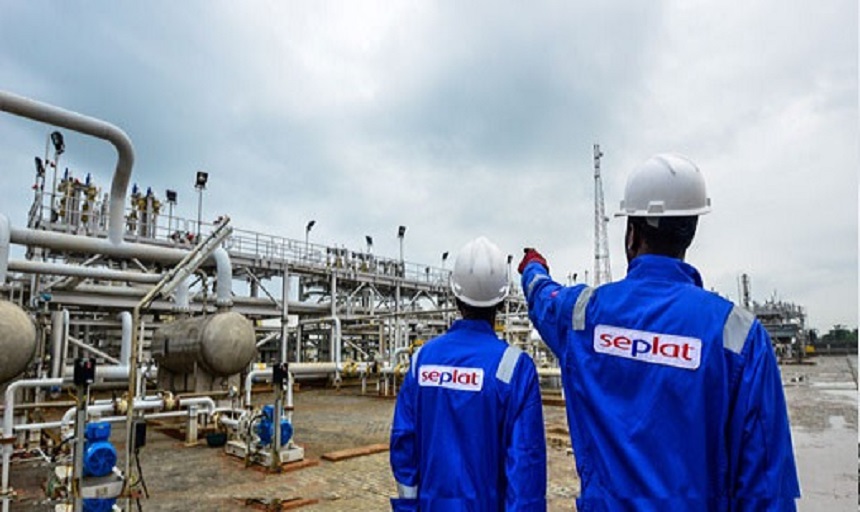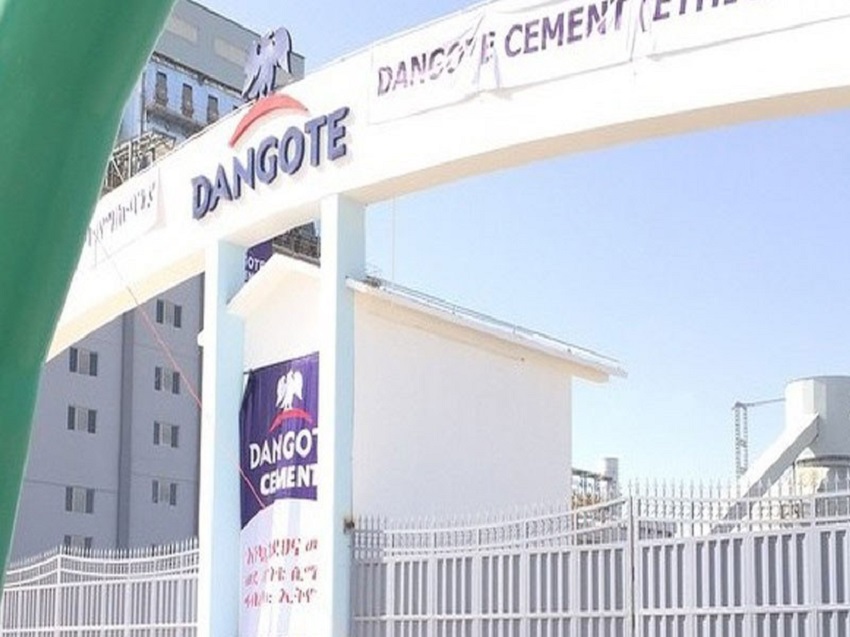Economy
Seplat Sheds N15 Per Share on News of Chairman’s $144m Court Case

By Dipo Olowookere
Shares of Seplat Plc have depreciated by N15 since the beginning of this week, Business Post is reporting.
This development came on the back of news last weekend about Chairman of the oil firm, Mr Ambrosie Ojiako, being ordered by a Lagos court to pay three financial institutions the sum of $144 million.
According to reports, Mr Orjiako and his firm known as Shebah Exploration and Production Company Limited were asked to pay the amount to Skye Bank (now defunct and known as Polaris Bank), Diamond Bank and the Africa Import Export Bank.
A Federal High Court sitting in Ikoyi had certified judgment delivered by the High Court of Justice Queen’s Bench Division and upheld by the Supreme Court of the United Kingdom, directing Shebah Exploration & Production Company Ltd, Allenne Ltd and its president, Mr Orjiako, to pay the three lenders a sum of $144.2 million.
Seplat is a company trading its shares on both the Nigerian Stock Exchange (NSE) and the London Stock Exchange (LSE).
At the local stock market on Monday, Seplat closed flat, trading at N630 per share.
However on Tuesday, shares of the firm depreciated by N10, ending at N620 per share at the close of the day’s session.
At the market on Wednesday, Seplat lost N5 to settle at N615 per share.
Business Post reports that yesterday, the management of Seplat had to release a statement to the NSE, emphasising that the company was never a party to the suit, but only its Chairman, Mr Ojiako.
“Seplat, a leading Nigerian indigenous oil and gas company listed on both the Nigerian Stock Exchange and London Stock Exchange, has been made aware of some media publications on the enforcement by the Federal High Court in Ikoyi, Lagos, Nigeria of a $114 million judgment made by a UK High Court against Shebah Exploration & Production Company Ltd, Allene Ltd and Dr Ambrosie Orjiako (who is also the Chairman of the Board of Directors of SEPLAT).
“Seplat is not a party to the litigation. The company will monitor the progress of this suit and issue further communication on the matter as appropriate,” the statement had clarified.
This may have had a little effect on the shares of the company today as its securities closed flat at the close of transactions at N615 per share.
BACKGROUND OF THE $144 MILLION CASE
Reports have it that the Lagos court certified the judgments on March 28 and ordered the defendants to comply with the judgment, denying them the permission to appeal it.
The first defendant, Shebah Exploration & Production Company Ltd is a Nigerian company engaged in oil exploration and production while the second defendant, Allenne Ltd is the guarantor of the borrowed loan.
The third defendant, Mr Orjiako, is the President of Shebah and a personal guarantor of the liabilities of Shebah and Allenne pursuant to a Deed of Guarantee and Indemnity dated July 1, 2011.
The claimants had dragged the defendants before the High Court of Justice Queen’s Bench Division in order to be able to recover an outstanding of the facility loan granted to them.
The claimants had apply for a summary judgment against the defendants for sums outstanding under a syndicated loan facility agreement totalling over $144.2 million, together with interest on those sums.
They had prayed the court to determine whether it is arguable that, in entering the Facility Agreement, the parties were contracting on the claimants’ written standard terms of business so as to engage section 3 of the Unfair Contract Terms Act 1997 (‘UCTA’).
In a judgment delivered by Mr Justice Phillips of the High Court of Justice Queen’s Bench Division on February 19, 2016, the court said Shebah had taken the loan for purpose of discharging certain of its existing borrowing and to provide working capital for its operations, including funding for a work-over programme to stimulate production at oil wells in the Ukpokiti oil field.
According to the court, the defendants never denied that the claimants advanced $150 million to Shebah pursuant to the Facility Agreement, nor dispute that, apart from paying one instalment of $6,111,111.11 in June 2012 but Shebah has failed to meet any further repayment instalment, despite the claimants agreeing to the deferral of several instalments.
The judge said in a previous proceeding, which commenced on March 11, 2014, the defendants agreed that, in exchange for the claimants’ discontinuing the proceedings, Shebah would repay all sums outstanding under the Facility Agreement in two tranches: $49.999,999.86 (with accrued interest) by April 30, 2014 and the balance of the loans and interest by July 1, 2014.
He added that Shebah failed to pay any part of the sum due on April 30, 2014. “The claimants were therefore entitled, under the terms of the Discontinuance Agreement, to commence fresh proceedings in respect of their claims.
These proceedings were commenced on June 2014, repeating the claims previously made and adding a claim against Shebah in respect of the $49.999,999.86 due under the Discontinuance Agreement”, the judge said.
Phillips stated that notwithstanding their previous stance, the defendants now contended that no sums whatsoever are due to the claimants, adding that they (the defendants) have arguable defence to the claim.
The judge however ruled that there is no merit in the defendants’ contention on the issues on the ground that there is simply no basis for inferring that the claimants, or any of them, habitually put forward the LMA form (or a tailored version of it) as a basis for their syndicated loan transactions.
“The most likely scenario is that it was chosen or selected by the claimants’ lawyer and that they will have adapted it to reflect the specifics of the transactions. It is impossible to draw any inferences as to what starting points may have been taken in other transactions, involving other permutations of lenders and other lawyers.
“I therefore satisfied that the defendants do not have a realistic prospect of establishing at trial that the Facilities Agreement is on the claimants’ written standard terms of business. The suggestion that the disclosure might alter the position is a classic example of hoping that something may turn up, in this case a forlorn hope given the evidence that there was in fact a degree of real negotiation of the final terms.”
Phillips in his judgment held that whilst the claimants’ purported acceleration of the loans on October 16, 2013 was ineffective, the defendants do not have a defence to the claimants’ alternative case, based upon the acceleration notice dated October 2, 2014 and subsequent demands dated April 14, 2015 and July 27, 2015.
“For the reasons set out above, the claimants are entitled to summary judgment against all three defendants for (i) the principal outstanding under the Facility Agreement of $143,888,888.89, subject to giving credit for the sum paid during the course of this application and the sums conceded in respect of default charges and hedging fees; (ii) the management fees claimed; and (iii) interest calculated on the alternative basis that the loan was accelerated on October 2, 2014”, the judge held.
Dissatisfied with the judgment, the defendants approached the Supreme Court of the United Kingdom, seeking to quash the judgment.
Ruling on the defendants’ application, the Supreme Court sitting comprising Lord Mance, Lord Reed and Lord Lloyd-Jones upheld the decision of the lower court and refused the permission to appeal the decision.
“After consideration of the application filed on behalf of the Appellants seeking permission to appeal the order made by the Court of Appeal on June 28,2017 and of the notice of objection filed by the Respondents.
“The court ordered that (1). Permission to appeal be refused because the application does not raise an arguable point of law of general importance. “(2). The Appellants pay the Respondents costs of the application and, where the Respondents apply for costs, the costs to be awarded be assessed.”
Economy
NCSP, NACCIMA Move to Unlock SME-led Industrial Growth

By Adedapo Adesanya
The Nigeria–China Strategic Partnership (NCSP) has reaffirmed its commitment to consolidate engagements with the Organised Private Sector while strengthening strategic collaboration to accelerate Nigeria’s industrial expansion, following a high-level meeting with the leadership of the Nigerian Association of Chambers of Commerce, Industry, Mines and Agriculture (NACCIMA).
The dialogue focused on aligning institutional efforts to deepen Nigeria–China economic cooperation and position Small and Medium Enterprises (SMEs) as primary beneficiaries of trade, manufacturing, and investment initiatives.
The Director-General of NCSP, Mr Joseph Tegbe, stated that the Partnership was established as a structured coordination platform to drive Nigeria’s strategic economic engagement with China in a disciplined and result-oriented manner.
He outlined its core mandates, including oversight of FOCAC-related initiatives, advancement of priority economic initiatives, and the facilitation of catalytic industrial projects across priority sectors.
Mr Tegbe emphasised that the next phase of engagement will prioritize harmonization of ongoing initiatives, stronger inter-agency coordination, and clearer execution frameworks to ensure Nigerian businesses, particularly SMEs, benefit more directly and sustainably from bilateral trade and investment initiatives.
According to a statement, NSCP said the meeting reviewed existing collaborations and investment pipelines, with both parties agreeing on the need to streamline coordination across federal and subnational levels to improve policy coherence, enhance implementation efficiency and eliminate fragmentation to take advantage of scale.
Mr Tegbe further highlighted the strategic importance of leveraging landmark trade instruments like China’s Zero-Tariff Agreement with African countries as a pathway to scale-up domestic manufacturing, deepen value addition, and strengthen Nigeria’s export competitiveness.
On his part, the President of NACCIMA and Chairman of the Organised Private Sector of Nigeria (OPSN), Mr Jani Ibrahim, commended NCSP’s structured engagement model and its deliberate focus on SMEs as drivers of inclusive industrial growth.
He reaffirmed the readiness of the organised private sector to collaborate closely with NCSP in mobilising enterprises, providing structured policy feedback, and ensuring measurable enterprise-level outcomes from Nigeria–China economic engagements.
Both sides identified practical pathways to integrate SMEs into manufacturing value chains linked to Chinese partnerships; expand agro-processing and value-added production; strengthen technical and vocational education collaborations to close industrial skills gaps; and promote the development of geo-cluster industrial parks capable of anchoring regional manufacturing ecosystems.
They agreed to establish a formal working interface to translate strategic alignment into measurable results, with defined focus areas including investment facilitation, SME capacity development, industrial cluster formation, and export-oriented growth.
The meeting underscores NCSP’s resolve to convert diplomatic goodwill into tangible economic gains, expand opportunities for Nigerian businesses and strengthen productive capacity, leveraging NACCIMA’s network, the statement added, saying this aligns with President Bola Tinubu’s Renewed Hope Agenda, which seeks to achieve sustained and inclusive growth anchored on industrial productivity and private-sector dynamism.
Economy
Nigeria’s Inflation Eases Further to 15.1% in January 2026

By Adedapo Adesanya
Nigeria’s headline inflation rate eased further to 15.10 per cent in January 2026, down from 15.15 per cent in December 2025, continuing the moderation that started in the latter months of 2025.
According to the National Bureau of Statistics (NBS), Consumer Price Index (CPI) declined to 127.4 points in January 2026, reflecting a 3.8-point decrease from the preceding month of December 2025, which came in as 131.2 points.
The data, which is the first of the year, beat analysts’ expectations, which had expected an 18 per cent growth. Instead, the January 2026 print showed a decrease of 0.05 per cent compared to the December 2025 Headline inflation rate.
On a year-on-year basis, the inflation rate was 12.51 per cent lower than the rate recorded in January 2025 (27.61 per cent). This shows that the Headline inflation rate (year-on-year basis) decreased in January 2026 compared to the same month in the preceding year.
On a month-on-month basis, the Headline inflation rate in January 2026 was -2.88 per cent, which was 3.42 per cent lower than the rate recorded in December 2025 (0.54 per cent). This means that in the review month, the rate of increase in the average price level was lower than the rate of increase in the average price level in December last year.
The percentage change in the average CPI for the twelve months ending January 2026 over the average for the previous twelve-month period was 21.97 per cent, showing a 4.37 per cent increase compared to 17.59 per cent recorded in January 2025.
Nigeria’s food inflation rate in January 2026 was 8.89 per cent on a year-on-year basis. This was 20.73 percentage points lower compared to the rate recorded in January 2025 (29.63 per cent).
On a month-on-month basis, the Food inflation rate in January 2026 was -6.02 per cent, down by 5.66 per cent compared to December 2025 (-0.36 per cent).
The decline can be attributed to the rate of decrease in the average prices of water yams, eggs, green peas, groundnut oil, soya beans, palm oil, maize (corn) grains, guinea corn, beans, beef meat, melon (egusi) unshelled, cassava tuber, and cow peas (white).
The NBS data showed that the average annual rate of food inflation for the twelve months ending January 2026 over the previous twelve-month average was 20.29 per cent, which was 18.18 percentage points lower compared with the average annual rate of change recorded in January 2025 (38.47 per cent).
Economy
Terrahaptix Secures Additional $22m from Investors, Valuation Hits $100m

By Adedapo Adesanya
Nigerian defence technology startup, Terra Industries, has extended its funding round to $34 million after securing an additional $22 million from investors, making it a $100 million company.
The new capital round was led by venture firm Lux Capital, with injections from the chief executive officer of Lagos-based unicorn Flutterwave, Mr Gbenga Agboola, as well as angel investors such as American actor Jared Leto and Jordan Nel.
The company said in a statement on Monday that the round was completed in under two weeks.
This comes weeks after it raised $11.75 million in January. That funding round was led by 8VC founded by the co-founder of Palantir Technologies Inc., Mr Joe Lonsdale. Other investors included Valor Equity Partners, Lux Capital, SV Angel, Leblon Capital GmbH, Silent Ventures LLC, Nova Global and angel investors, including Mr Meyer Malka — the managing partner of Ribbit Capital.
Some of the investors in the new round included 8VC, Nova Global, Silent Ventures, Belief Capital, Tofino Capital, and Resilience17 Capital, founded by Flutterwave CEO.
Terrahaptix, founded by Mr Nathan Nwachukwu and Mr Maxwell Maduka, will use the new funding to expand Terra’s manufacturing capacity as it expands into cross-border security and counter-terrorism.
The extension also comes amid growing international expansion. Earlier this month, Terra announced a partnership with Saudi industrial giant AIC Steel to launch a manufacturing hub in Saudi Arabia focused on producing infrastructure security systems.
In the coming weeks, the company also plans to unveil a mega factory, an indication of the company’s growth and importance, particularly as the need for security has risen in recent years, as groups such as Islamic State and al-Qaeda are gaining ground in Africa, converging along a swathe of territory that stretches from Mali to Nigeria.
According to Mr Nwachuku, the initial $11.75 million raise created significant momentum for the company, enabling it to close the additional $22 million in just under two weeks.
He added that beyond capital, the investors were selected for their experience building similar hard-tech and defence-focused companies.
-

 Feature/OPED6 years ago
Feature/OPED6 years agoDavos was Different this year
-
Travel/Tourism10 years ago
Lagos Seals Western Lodge Hotel In Ikorodu
-

 Showbiz3 years ago
Showbiz3 years agoEstranged Lover Releases Videos of Empress Njamah Bathing
-

 Banking8 years ago
Banking8 years agoSort Codes of GTBank Branches in Nigeria
-

 Economy3 years ago
Economy3 years agoSubsidy Removal: CNG at N130 Per Litre Cheaper Than Petrol—IPMAN
-

 Banking3 years ago
Banking3 years agoSort Codes of UBA Branches in Nigeria
-

 Banking3 years ago
Banking3 years agoFirst Bank Announces Planned Downtime
-

 Sports3 years ago
Sports3 years agoHighest Paid Nigerian Footballer – How Much Do Nigerian Footballers Earn













